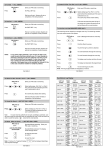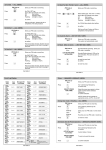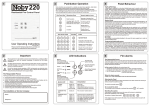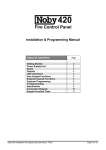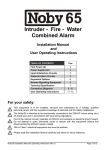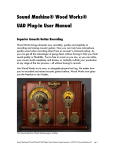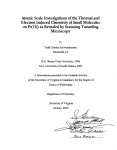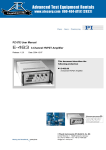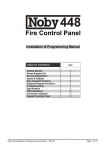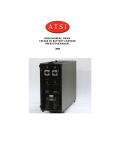Download N448 User Manual & Log Rev 1
Transcript
Noby-448 User Operating Manual & Log Book Page 1 of 12 Fire Control Panel User Operating Manual & Log Book TABLE OF CONTENTS Introduction Keypad Operation LED Indications What to do in the event of a fire? Routine Testing Contact Details Installation Details Log: Event Log Log: Test Log Log: Engineer Service Log Page 1 2 3 3 4 5 6 7 9 12 Introduction This document is primarily aimed at the end-user of the Noby-448 Fire Control Panel, and should be handed over to a Responsible Person on completion of the installation work. The Responsible Person is the person at the site who would normally: • prepare Fire Alarm Procedures for the premises • ensure that all personnel are familiar with the Fire Alarm Procedures • ensure that persons likely to operate the Fire Control Panel are familiar with its operation, and know where the User Operating Manual is stored. • ensure that all detectors and call-points remain free from obstruction • routinely test the Fire Alarm System • contact the Installation/Service Company in the event of a fire, system fault or false alarms • ensure that the Fire Alarm System is regularly serviced • maintain a log book of all activities related to the Fire Alarm System Noby-448 User Operating Manual & Log Book Page 2 of 12 KEYPAD OPERATION General Each of the following functions of the fire control panel must be preceded by the 4 digit Access Code [3][6][3][6]. Successful entry of the Access Code is confirmed by the red Function LED. Pressing [5] to Quit at any time will cause the system to revert back to normal standby mode, otherwise the system will automatically revert back after 10 seconds of inactivity. Mute Sounders Main external sounders switched off. [3][6][3][6] [1] Mute Panel [3][6][3][6] [4] Panel internal sounders (piezos) switched off. System Reset All LEDs are tested for 3 seconds. [3][6][3][6] [5] Quick Reset [3][6][3][6] [1] [4] [5] A Quick Reset is an amalgamation of the first three operations above. Note : Main sounders & Panel sounders MUST be individually muted before a reset can is accepted. Reset is acknowledged by a 3 second LED test. Evacuate [3][6][3][6] [2] Main sounders, Panel sounders and Fire Relay are activated (provided they have not been isolated). Zone_Isolate & Relay_Isolate [3][6][3][6] [3] This function is used to Isolate zones and/or the Fire Alarm Relay. The current isolation status is displayed by any flashing yellow zone LED’s and/or the Relay_Isolate LED. Note that scrolling down automatically wipes any pre-existing isolation status LEDs, and that it is therefore advisable to check the whole isolation suite prior to exiting this procedure. Key [1] to Scroll-Down and highlight the desired yellow zone LED (or the Relay_Isolate LED) for selection. Key [3] to Toggle the selected zone (or the relay) on or off – the LED flashes when isolation is active. Key [4] to Accept and update the current isolation status and then revert back to normal standby mode . . .OR Key [5] to Quit and revert back to normal standby mode without updating the displayed isolation status. Once back in normal standby mode any isolated zone (or relay) is confirmed by a flashing zone fault LED (and/or Relay_Isolate LED). Zone_Isolate and/or Relay_Isolate operations should only be performed or authorised by the Installation/Service Company). Test [3][6][3][6] [6] This function is used to ‘one-man’ test the system. Key [1] to Scroll-Down and highlight the zone for test. Key [6] to Toggle the zone selected for test on or off – the yellow zone LED will flash when in test mode. It is now possible to trigger each detector in turn on the selected zone. The sounders are activated momentarily (provided they are not isolated) and the Zone Fire LED is latched. The Fire Alarm Relay is not activated. Key [5] to Quit to revert back to normal standby mode. The system will revert back to normal standby mode after 90 seconds of panel inactivity (i.e. no keypad operations or zone activations). Any fire alarm generated from a non-test zone will cause the system to abort the test and give the appropriate fire response. Noby-448 User Operating Manual & Log Book Page 3 of 12 LED Indications LED Indications Continuous Flashing 8 Zone Fire LED’s Common Fire LED Zone Fault LED’s (non-latching) ** Common Fault LED Sounder Fault LED PSU Fault LED CPU Fault LED Power LED Relay Isolate LED Function LED Isolate LED Test LED Zones alarmed One or more zones in fire condition First to alarm N/A Zone/s isolated (slow flash) Head Removed (intermittent ‘winking’) Fault Input terminal active, non-latching Sounders Isolated Fuses F1,F2,F7, Low volts & Battery CPU watchdog warning Mains restored Relay isolated N/A One or more zones isolated 7 day fire test reminder Zone/s in fault Any zone fault or system fault Sounder fault Low voltage (< 21 volts), non-latching Remote Bus fault Primary supply (mains) OK. Off=mains fail N/A Access code successfully entered N/A N/A WHAT TO DO IN THE EVENT OF A FIRE ALARM ? User responsibilities The Responsible Person for the fire alarm should devise written procedures for the action to be taken in the event of a fire alarm and ensure that all other users have received sufficient training on how to operate the system properly and that they are familiar with these procedures. In the event of a fire In the event of a fire alarm the fire control panel will: • activate the Main Sounders and internal Panel Sounder. • activate the Alarm Relay which may trigger any connected ancillary equipment. • the LED display will indicate: o Common Fire LED o one or more Zone LEDs indicating the location of the fire (the first zone to alarm is distinguishable by a flashing Zone Fire LED) When the alarm sounds • CARRY OUT THE PRESCRIBED FIRE ALARM PROCEDURE Silencing the panel Only after the prescribed Fire Alarm Procedures have been carried out should you silence the audible sounders. • Mute Sounders [3][6][3][6] [1 Mute Sndrs] • Mute Panel [3][6][3][6] [4 Mute Panel] To re-sound the alarm Once silenced the sounders can be manually re-activated: • Evacuate [3][6][3][6] [2 Evacuate] Resetting the system Only perform a System Reset once the cause of the alarm has been established. • Quick Reset [3][6][3][6] [1] [4] [5] If the original cause of the alarm still exists or has not cleared then the alarm will immediately re-sound. Noby-448 User Operating Manual & Log Book Page 4 of 12 ROUTINE TESTING The Fire Alarm System should be periodically tested by the Responsible Person to ensure that it remains fully functional at all times. Daily Check the panel for normal operation. The green Power LED should be lit. The Isolate LED may be flashing in which case one or more yellow zone fault LEDs will also be flashing. ** The Relay_Isolate LED may be flashing.** Any other fault indication should be recorded in the Event Log and the Installation/Service Company informed. ** Zone_Isolate and/or Relay_Isolate operations should only be performed or authorised by the Installation/ Service Company). Weekly Operate at least one manual call point or detector to ensure correct operation of the Noby-448 Control Panel. If possible, choose a different device to trigger the Fire Alarm System each week, by rotation, such that the whole system is eventually tested over a period of time. A record of the test should be kept in the Test Log. The Installation/Service Company may have configured a Weekly Test Reminder option, which will flash the Test LED and sound an intermittent bleep when a test is due. This reminder will be automatically reset after a test has been carried out. Quarterly Every three months the Installation/Service Company should check the Fire Alarm System: • • • • • • Check the log book entries and confirm that any remedial action has been taken. Check the battery and its connections. Remove mains supply and check that the battery is capable of supplying the alarm sounders. Operate at least one call point or detector in each zone to test the fire alarm as per above. Perform a visual inspection of the fire alarm system for any alterations or obstructions. Issue a certificate of testing. Annually Every twelve months the Installation/Service Company should check the Fire Alarm System. This check is similar to the quarterly check except that every device on the system should be checked for operation Noby-448 User Operating Manual & Log Book Page 5 of 12 CONTACT DETAILS Site Name ______________________________________________ Site Address ______________________________________________ ______________________________________________ ______________________________________________ ______________________________________________ Responsible Person ___________________________ Installer Name ______________________________________________ Installer Address ______________________________________________ ______________________________________________ ______________________________________________ ______________________________________________ Tel No ___________________________ Fax No ___________________________ Emergency Contact Office Hours ______________________________________________ 24 Hour ______________________________________________ Noby-448 User Operating Manual & Log Book Page 6 of 12 INSTALLATION DETAILS Zone Circuit Details Location Detectors Type Qty Call Points Comments 1 2 3 4 5 6 7 8 Sounder Circuit Details Location Sounders Type 1 2 3 4 5 6 7 8 Comments Qty Noby-448 User Operating Manual & Log Book Page 7 of 12 EVENT LOG Date Zone / Device Event Action Signature Noby-448 User Operating Manual & Log Book Page 8 of 12 EVENT LOG Date Zone / Device Event Action Signature Noby-448 User Operating Manual & Log Book Page 9 of 12 TEST LOG Date Zone / Device Comment Signature Noby-448 User Operating Manual & Log Book Page 10 of 12 TEST LOG Date Zone / Device Comment Signature Noby-448 User Operating Manual & Log Book Page 11 of 12 TEST LOG Date Zone / Device Comment Signature Noby-448 User Operating Manual & Log Book Page 12 of 12 ENGINEER SERVICE LOG Date Inspection / Work Done Signed












